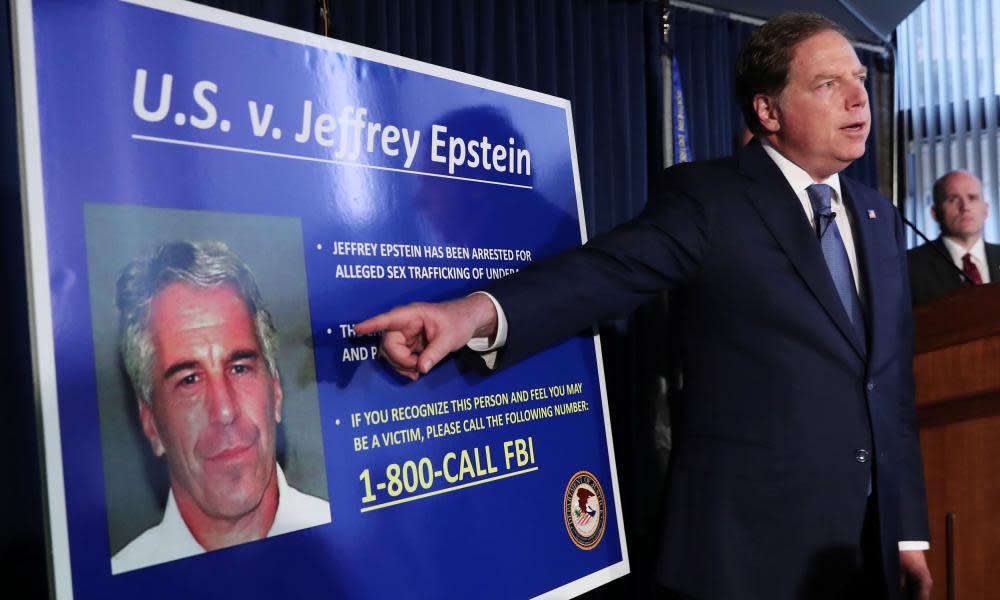Jeffrey Epstein: prosecutors accuse financier of witness tampering

Jeffrey Epstein, the American financier who was charged with federal sex trafficking crimes on Monday, transferred $350,000 to two close associates in late 2018 in what federal prosecutors say was an attempt to “influence witnesses”.
The payments were revealed in a letter to Judge Richard Berman on Friday afternoon in opposition to Epstein’s request to be released on bail while he awaits trial on charges of sexually exploiting, abusing and trafficking girls as young as 14 years old.
The US attorney Geoffrey Berman wrote that Epstein “has a history of obstruction and manipulation of witnesses” including incidents when he was under investigation in the state of Florida in 2006, but most recently following the Miami Herald’s publication of series of articles examining how that Florida investigation resulted in a controversially lenient 2008 plea agreement on state charges and a federal non-prosecution agreement.
On 30 November 2018, just two days after the publication of the first Miami Herald article, Epstein wired $100,000 to an individual identified as a “potential co-conspirator” in the non-prosecution agreement, according to financial records obtained by the prosecution. Three days later, on 3 December, Epstein wired an additional $250,000 to one of his employees, who was also named as a possible co-conspirator.
Related: Jeffrey Epstein asks to be released on bail while awaiting sex trafficking trial
“This course of action, and in particular its timing, suggests the defendant was attempting to further influence co-conspirators who might provide information against him in light of the recently re-emerging allegations,” Berman wrote.
The financial records obtained by prosecutors from an unnamed institution also provided one of the first hints to Epstein’s true wealth. Long described as a billionaire, the New York Times reported on Wednesday that much of his reputation as a brilliant financier was probably illusionary, and that there was “little evidence” of him actually having a net worth in the billions.
Prosecutors said that Epstein was “extravagantly wealthy”, however, noting that documents obtained recently from the same financial institution reveal that he is worth at least $500m and earns more than $10m each year.
Epstein’s wealth and alleged potential for witness tampering were just two of the government’s arguments against the bail package proposed by Epstein’s attorneys on Thursday. The defense argued that Epstein had been a “law-abiding citizen” for the last 14 years, and that he posed no threat to the public or risk of fleeing. They proposed using Epstein’s $77m mansion and private jet as collateral, and pledged to pay for security personnel to enforce his house arrest.
Prosecutors rejected the proposal, writing, “Any doubt that the defendant is unrepentant and unreformed was eliminated when law enforcement agents discovered hundreds or thousands of nude and seminude photographs of young females in his Manhattan mansion on the night of his arrest, more than a decade after he was first convicted of a sex crime involving a juvenile.”
Describing Epstein’s proposal of house arrest as a “gilded cage”, the prosecutors noted that several victims have informed the government that “they would be fearful for their safety” if Epstein were released. The letter also said that since the indictment was unsealed on Monday, “several” more women have come forward alleging that they were victims of Epstein when they were minors.
A hearing on Epstein’s detention is scheduled for Monday.

